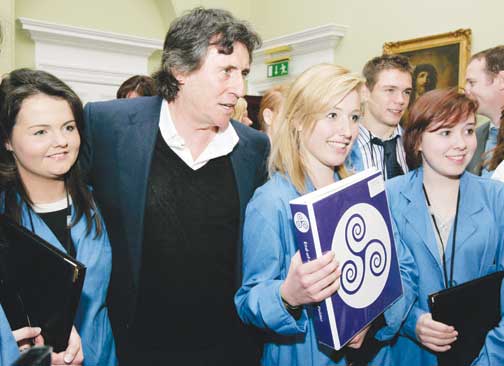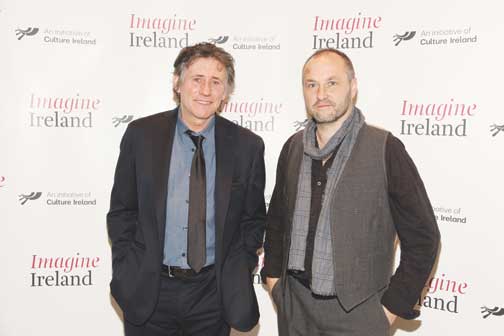


SERVICES
Tuesday February 8, 2011
Diagnosing Ireland
As well as playing a doctor on HBO's In Treatment, Gabriel Byrne also helps healthcare organizations in real life. Here he was at Dublin's Mater Hospital where he thanked staff for their involvement in the Hospice Friendly Hospitals Program and encouraged them to continue working to improve end-of-life care (Photocall) The Irish are justifiably angry, Hollywood Star Gabriel Byrne tells Vincent Murphy, but they'll still probably elect the Usual Suspects"I'm not an economist but I think it's pretty clear what happened," Gabriel Byrne says, "The country was Madoff-ed. "And I think we have a natural desire for retribution." The Irish actor plays television's most famous psychiatrist on HBO's In Treatment and right now what he's prescribing for his home country is justice. "I think when Madoff was put in jail here, a lot of people felt there was some kind of retribution, some kind of closure," he says. "That doesn't seem to be happening over there." It's now over two years since the Irish government gave a blanket guarantee to the debts and liabilities of Irish banks, and details started to emerge of suspicious financial transactions at Anglo Irish Bank. In the intervening years, bankers like Sean Fitzpatrick and David Drumm have become social pariahs in their home country, but no-one has been prosecuted. The Garda Fraud Bureau and the Office of the Director of Corporate Enforcement have been investigating alleged wrongdoings at Anglo and other banks. But no-one has yet ended up behind bars. And unlike most other countries who have been suffering the effects of the global recession, there has not been an election until now. Since the crisis began, Barack Obama has been elected US president and his party has suffered a 'shellacking' in the Mid-Terms. In the UK, the government of Gordon Brown has been turfed-out of office to be replaced by a coalition of David Cameron's Conservative Party and Nick Clegg's Liberals. But in Ireland, Brian Cowen and his government have continued in office. There's a real hope that if the upcoming election offers nothing else, it will offer an opportunity to draw a line in the sand - to look forward, instead of constantly looking back and pointing the finger of blame. Byrne says he's noticed that Irish people now seem to carry a strange guilt about the Celtic Tiger. "I hear sometimes when I'm talking to people 'Oh we shouldn't have done that' and a certain amount of shame in it," he says. But he says the truth is, not everybody got carried away. Not everyone partied. "I don't think everybody had a great time during the Celtic Tiger. I think it's perceived that the entire country went crazy and everybody overspent." The election has led to loud calls for political reform in Ireland, with talk of "Reclaiming the Republic" and so forth. "Funnily enough, they are saying the same things here," says Byrne, "there are politicians who are saying 'Let's take America back'. "But back from what, to what... I don't know." Byrne sees echoes of the mood which spawned the Tea Party in the US in the Irish situation. "There is a certain amount of anger, real anger, on the ground with the system here in the US that may or may not translate into action. "But I think the Mid-Terms proved that Americans had a voice. And they sent the Democrats a harsh lesson."
Gabriel Byrne and Colum McCann at the launch of the 'Imagine Ireland' campaign (Will Ragozzino) In Ireland, he sees a similar desire among ordinary people to let their political masters know that they are angry, and that they are too disconnected from the people. But Byrne remains unconvinced that real change will happen. "The truth is, from my point of view, what can actually happen? A coalition of the parties that are there already without real political reform, really fundamental political reform, I don't know that that's going to change anything." "How does one harness the legitimate anger that's on the ground and use it to reclaim politics, to reclaim the system of government? "Classically that's a time when an alternative radical party could come into power, either from the right or from the left. "And a radical shift to the right or the left in Ireland is something that I still wouldn't rule out, but I think that unless there is a real profound change in the political system, like in Washington, then it's just going to be more of the same." He smiles at me, "Is that too pessimistic a view?" We're not even here to talk about politics. We're here to talk about art. Byrne is Ireland's Cultural Ambassador and in that role he's been spearheading the promotion of a year-long festival of Irish arts in the United States called "Imagine Ireland". It's the biggest ever tour of Irish music, theatre, visual arts and dance in the US, taking in 40 states. The Irish government has justified the $5m cost of the tour - saying it will open new cultural links, promote Ireland as a tourist destination and cast Ireland in a positive light at a time when we are in international headlines for all the wrong reasons. But Byrne is unhappy at the spin being put on it. "Economically we will recover," he says, "But artistically we have never been set back." "Economically, Ireland has gotten a lot of bad press here obviously. But this isn't about 'oh now let's tell the good news'. Irish culture consistently has always been evolving, and it will continue to do that through good times and bad. "It's been the story of our history, how our artists have turned great sorrows and great tribulations into amazing art." He knows too well that the general public may baulk at seeing millions being spent on art at a time when money is scarce. "In and of itself, it is not going to put bread on the table, nor will it stop immigration. "But perhaps artists can lead the way, and lead the way for politicians to reexamine the nature of the society we inhabit. "Because art will transform a society as fast as a politician, in a more profound way I deeply believe." Byrne speaks of the potential of art, particularly in a recession, to offer hope and inspiration with a deep passion. "I'm very interested in getting the message of art, and community art, across to young people, and how powerful the presence of art can be in your life, how it can break down barriers, social barriers, and can free the imagination. "Introducing that concept into the lives of young people is one of the goals that I have." He says at a local level, a drama society can offer somewhere to escape the prevailing mood of depression and negativity, and offer something, for want of a better word, happy. "I'm a huge supporter of the Irish Amateur Drama group, you know, because that combines social and artistic functions that only another organization say like the GAA can fulfill." "In these times especially it's really important the people have unfettered access at least to the world of the imagination. "Because the world of the imagination can show us ways to deal perhaps with the economic crisis we are currently going through. "I'm not saying it's the answer, but I'm saying it at least provides perspective." |
CURRENT ISSUE

RECENT ISSUES


SYNDICATE
[What is this?]
POWERED BY

HOSTED BY

Terms of Service | Privacy Policy
Website Design By C3I







